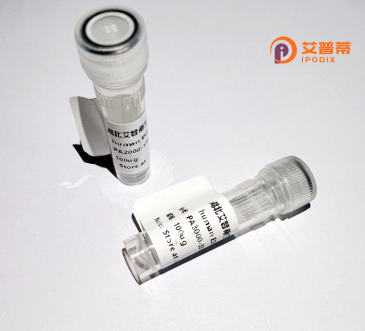
| 纯度 | >90%SDS-PAGE. |
| 种属 | Human |
| 靶点 | LINC00478 |
| Uniprot No | A1L4M7 |
| 内毒素 | < 0.01EU/μg |
| 表达宿主 | E.coli |
| 表达区间 | 1-104aa |
| 活性数据 | MEIILELQQSAQLHNREAGTQIDRQISQLVEGASGWQLWAFGCWTTIGKTEMEQGQKIAHFYSTQLLLFHDLQEFYWDNYPNKLQAFYPNGALSEMKRILNVKI |
| 分子量 | 11.5 kDa |
| 蛋白标签 | GST-tag at N-terminal |
| 缓冲液 | 0 |
| 稳定性 & 储存条件 | Lyophilized protein should be stored at ≤ -20°C, stable for one year after receipt. Reconstituted protein solution can be stored at 2-8°C for 2-7 days. Aliquots of reconstituted samples are stable at ≤ -20°C for 3 months. |
| 复溶 | Always centrifuge tubes before opening.Do not mix by vortex or pipetting. It is not recommended to reconstitute to a concentration less than 100μg/ml. Dissolve the lyophilized protein in distilled water. Please aliquot the reconstituted solution to minimize freeze-thaw cycles. |
关于LINC00478的研究多集中于其作为长链非编码RNA(lncRNA)的功能,目前尚未发现其编码蛋白质的明确证据,因此相关研究均围绕其RNA分子展开。以下是基于该lncRNA的研究文献示例:
1. **"LINC00478 promotes lung adenocarcinoma progression via sponging miR-204-3p"**
*作者:Zhang Y et al.*
摘要:研究发现LINC00478在肺腺癌中高表达,通过吸附miR-204-3p促进肿瘤细胞增殖和转移,提示其作为潜在治疗靶点。
2. **"Long non-coding RNA LINC00478 acts as a prognostic biomarker in colorectal cancer"**
*作者:Wang L et al.*
摘要:文章表明LINC00478在结直肠癌中表达升高,与患者预后不良相关,可能通过调控Wnt/β-catenin通路促进肿瘤进展。
3. **"LINC00478 induces epithelial-mesenchymal transition in breast cancer cells"**
*作者:Chen X et al.*
摘要:实验证实LINC00478通过激活STAT3信号通路诱导乳腺癌细胞上皮-间质转化(EMT),从而增强侵袭能力。
**注意**:目前研究均聚焦于LINC00478的lncRNA功能,尚未见其编码蛋白或重组蛋白的报道。如需RNA重组表达载体的文献或其他相关方向,建议进一步明确需求。
LINC00478 is a long intergenic non-coding RNA (lincRNA) located on human chromosome 3. While initially characterized as non-protein-coding, emerging studies suggest its regulatory roles in cellular processes, including cell proliferation, apoptosis, and DNA damage response. It has been implicated in multiple cancers, such as hepatocellular carcinoma, breast cancer, and glioblastoma, where it may act as an oncogene or tumor suppressor via interactions with miRNAs, mRNAs, or chromatin-modifying complexes.
Recombinant human LINC00478 protein refers to a lab-engineered version of any putative or context-specific micropeptide potentially encoded by alternative open reading frames within this lincRNA—a concept gaining attention as some lncRNAs are found to harbor small functional polypeptides. Produced using prokaryotic (e.g., *E. coli*) or eukaryotic expression systems, the recombinant protein is often tagged for purification (e.g., His-tag) and utilized to investigate uncharacterized translational products or RNA-protein interactions.
Current research focuses on validating its coding potential and clarifying molecular mechanisms. However, studies remain limited, and the functional relevance of such proteins, if any, requires further validation. Recombinant LINC00478 tools may aid in exploring its paradoxical roles in disease, though the primary focus remains on its RNA-mediated regulatory functions.
×